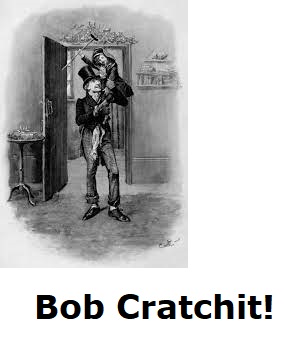Bob Cratchit’s EBITDA
(I recently applied for a ghostwriting job and one of the application’s requirements was to write 500 words on an acronym, EBITDA. I’d never seen it before but looked it up and then wrote the following below.)
Everyone knows the happy, inspiring conclusion to Charles Dickens’ A Christmas Carol: Scrooge is utterly transformed, Tiny Tim lives, Bob Cratchit gets a hefty raise and permission to add more coal to the stove and heat up the frigid office of Scrooge’s accounting business. Yes, it all turned out very well indeed, the best story ever with honest accountants and money managers at its narrative core. Certainly not what you got with Enron, Lehman Brothers, FTX, Covid relief fund auditors or President Trump’s recently released tax returns.
But what happened at the office of Scrooge and Marley after the happy ending? Cratchit still had to compute sums and subtractions with a quill pen and keep everything scrupulously accurate in thick ledgers by the dim light of a whale oil lamp.
Dickens wrote up this untitled story but never published it for reasons not entirely clear to scholars. Perhaps it was because no story about how a principled Victorian-era accountant who invented the process (and acronym) to calculate “earnings before interest, taxes, depreciation and amortization (EBITDA), not even one with ghosts and plum pudding, could possibly entertain any reader.
Really, though it was a great story with a classic Dickens hard luck character, a prostitute named Gerty Shankelskin, that Scrooge got off the streets and into the home for wayward women he founded. There was also a stray mutt and a big fire that nearly burned down St. Paul’s Cathedral. And always the ledgers, stacks and stacks of ledgers that were more accurate and accessible than software and blockchains in the cloud.
It is every fan of Dickens and law-abiding accountants everywhere that hopes to see the story published and rescue their profession from a general negative impression in popular culture.
Bob Cratchit invented the modern corporate accounting process in that office, EBITDA, by hand, with pen and ink, on paper, wearing a green eye shade and a waistcoat, sipping tea, smoking a pipe, by himself. (Scrooge was too busy serving the downtrodden of London to assist.) It all goes to show you that a superb and timeless writer like Dickens could take something seemingly as dull as corporate accounting and bring it to life, and more importantly, bring those people who work in such a business to the world’s attention. If only more writers did that today with the world of work. Everyone needs to know more about this subject.
(Note to reader: I got the job)

